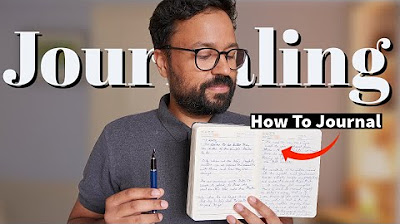How to Journal for Self Growth | Jim Kwik
Summary
TLDRIn this session, brain coach Jim Kwik shares a powerful tool for enhancing creativity, problem-solving, and achieving goals: journaling. He recounts a personal story about how writing down his goals helped transform his perspective and life direction. Jim emphasizes the importance of physically writing notes, rather than typing, to improve learning and critical thinking. He explains how geniuses like Da Vinci and Einstein used journals to capture their thoughts and challenges viewers to start or enhance their journaling habits. The key takeaway is that journaling fosters self-awareness and improves thinking.
Takeaways
- 💡 The power of perspective can help in achieving clearer thinking and creativity.
- 📚 Writing down thoughts and goals helps turn ideas into reality by making them tangible.
- 📝 Journaling and note-taking are essential habits for high-level thinkers and geniuses.
- 🎯 The 'capture and create' method improves understanding and critical thinking.
- ✍️ Handwriting notes forces you to prioritize important information and enhances retention.
- 🧠 Journaling builds self-awareness and metacognition, key to personal growth.
- 🔄 Regularly revisiting old journal entries provides valuable perspective.
- ⏰ Consistency in journaling and note-taking habits is key for long-term success.
- ❓ Asking the right questions, like 'How can I use this?' 'Why must I use this?' and 'When will I use this?' is crucial for learning.
- 📖 Journaling should be personalized, reflecting your own thoughts and experiences.
Q & A
What is the main purpose of the session led by Jim Quick?
-The purpose of the session is to introduce a powerful tool to help improve thinking, creativity, problem-solving, and achieving personal goals.
What personal story does Jim Quick share from his past?
-Jim Quick shares a story from when he was 18 and struggling in college, feeling overwhelmed and ready to quit. A conversation with a family friend helped him gain a new perspective and changed his approach to learning and achieving his goals.
What advice did the family friend give Jim when he was struggling?
-The family friend encouraged Jim to think about what he wanted to be, do, have, and share in life. He had Jim write these thoughts down in a journal to gain clarity and focus.
Why does Jim emphasize the importance of writing things down?
-Jim explains that writing things down transforms abstract ideas into reality. It helps organize thoughts and brings clarity by making invisible goals tangible and actionable.
What are the three important questions Jim suggests asking when taking notes?
-The three questions are: How can I use this? Why must I use this? When will I use this? These questions help focus the learning process and make the information more practical.
How does Jim Quick recommend setting up notes in a journal?
-Jim suggests dividing a notebook page into two columns. On the left, write down the lessons or important information. On the right, answer the three questions about how to use the information and any other creative thoughts.
Why does Jim recommend handwriting notes instead of typing them?
-Jim argues that handwriting notes forces the writer to filter and focus on important information, which improves retention and understanding, unlike typing, where one can transcribe without processing the content deeply.
What historical figures does Jim mention to emphasize the value of journaling?
-Jim mentions historical geniuses like Leonardo da Vinci, Marie Curie, and Einstein, who were known for keeping journals. He suggests that journaling helped them develop their thinking and creativity.
What benefits does journaling provide according to Jim Quick?
-Journaling helps build perspective, improves metacognition (thinking about one’s own thinking), and fosters self-awareness, which Jim describes as a 'superpower.'
What is Jim Quick’s assignment for viewers at the end of the session?
-Jim’s assignment is for viewers to get a dedicated notebook for the program, journal daily, even if it’s just one sentence, and reflect on their thoughts to enhance learning and personal growth.
Outlines

此内容仅限付费用户访问。 请升级后访问。
立即升级Mindmap

此内容仅限付费用户访问。 请升级后访问。
立即升级Keywords

此内容仅限付费用户访问。 请升级后访问。
立即升级Highlights

此内容仅限付费用户访问。 请升级后访问。
立即升级Transcripts

此内容仅限付费用户访问。 请升级后访问。
立即升级5.0 / 5 (0 votes)






